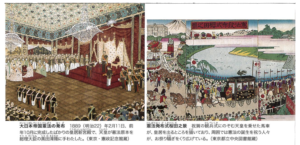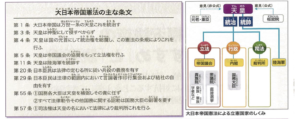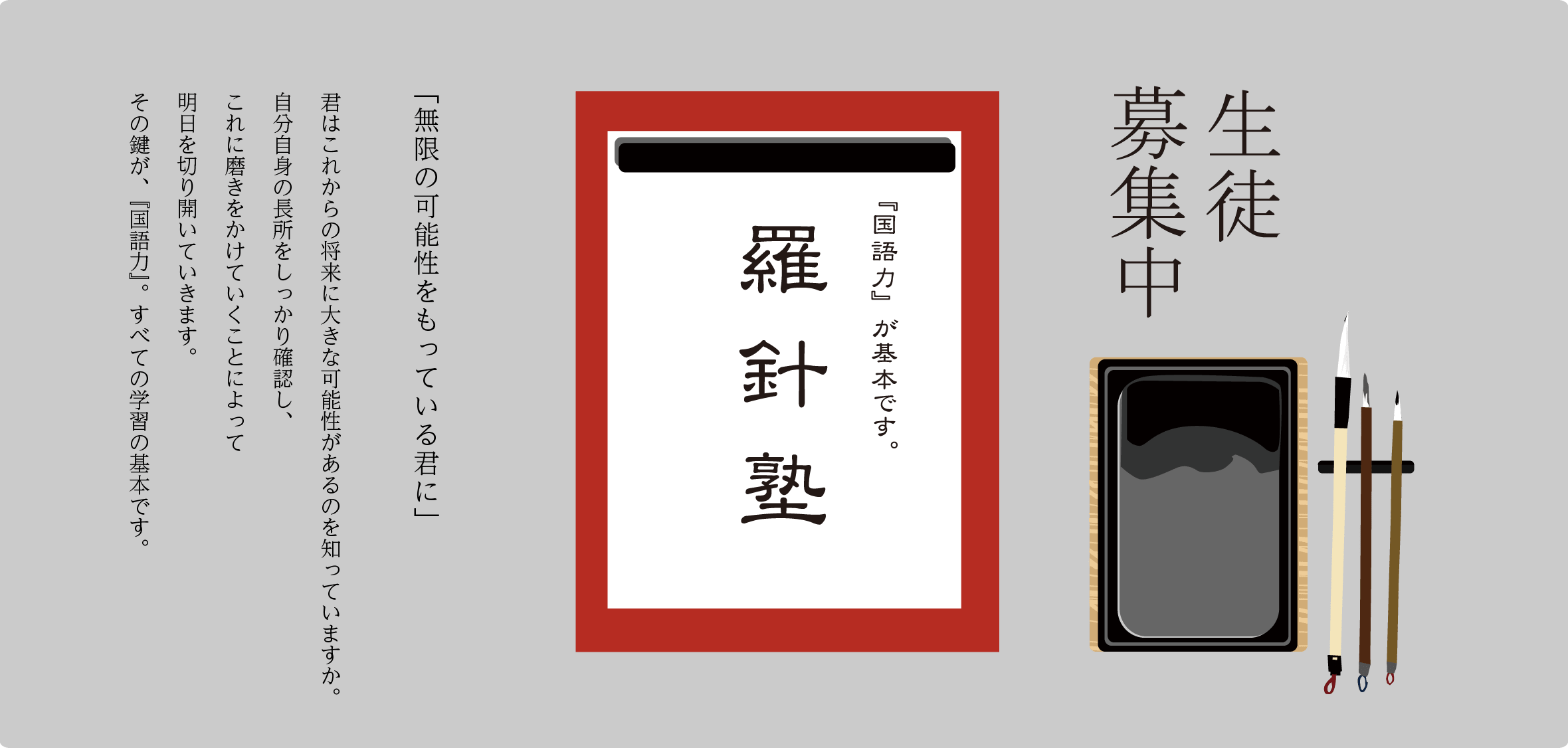長崎市五島町にある羅針塾 学習塾・幼児教室 https://rashinjyuku.com/wp では、塾生に辞書の活用法を身に付けて欲しいと考えています。惜しむらくは、現在の小・中学・高校生が普段使いするような辞書には、掲載されていない漢字や熟語があることです。そのときには、様々工夫をして調べるようにしています。
さて、明治の日本では西洋の列強に伍していく為にも憲法制定に腐心しました。戦後の学校教育では、米国に占領されていた昭和21年、米国から半ば強制的に大日本帝国憲法を改正させられた経緯は教えられていません。現在の憲法は、明治22年に制定された大日本帝国憲法を「木に竹を接ぐ*」形で公布されました。したがって、有史以来長い歴史を連綿とつないで来ている日本の国柄を理解する為にも、明治期の大日本帝国憲法の成立過程や内容を知っておく必要があります。
以下の記述は、中学の歴史教科書ですが、非常にポイントを突いています。
*木に竹を接ぐ・・・性質の違うものを繋ぎ合わせる。調和が取れぬことの喩え。
『新しい歴史教科書』(新版・中学社会)(自由社)英訳シリーズ その8-第4章「近代の日本と世界(I)―幕末から明治時代」http://www.sdh-fact.com/CL02_2/Chapter%204%20Section%203,%204.pdf
Topic 60 – The Meiji Constitution and the foundation of a constitutional state
What principles were enshrined within the Meiji Constitution?
The promulgation of the Meiji Constitution
On February 11, 1889 (Meiji 22), the Meiji Constitution, officially titled the Constitution of the Great Japanese Empire, was promulgated. On that day, raucous festivities took place throughout Tokyo, even though the city was still blanketed by the snowfall of the previous night. Celebratory gunfire rang out, costumed revelers went on parade, and floats snaked their way through the streets.The Meiji Constitution affirms in its first articles that the Emperor reigns over Japan. However, the government’s actual policies were to be enacted in accordance with the advice of the Emperor’s ministers, and the Emperor himself bore no political responsibilities.*1 The Meiji Constitution obligated all Japanese subjects to pay taxes and serve in the military, but guaranteed their rights to freedom of speech, assembly, association, residence, movement, and religion within the bounds of the law. Japanese subjects also had the right to vote for members of the House of Representatives in free elections. The enactment of budgets or laws required the consent of the national assembly, which was called the Diet. The Diet was composed of two houses: the popularly elected House of Representatives and the House of Peers, which included both peers and other distinguished men, such as scholars or bureaucrats, who were appointed by the Emperor.
*1=This concept is contained within Article 3 of the Meiji Constitution, stating that, “The Emperor is sacred and inviolable.” This article meant that the Emperor could not be held responsible for political decisions, but the implication of it was that the Emperor held no right to make political decisions.
60 大日本帝国憲法と立憲国家大日本帝国憲法は、どのような内容だったのだろうか。大日本帝国憲法の発布1889(明治22)年2月11日、大日本帝国憲法が発布された。この日は、前夜からの雪で東京市中が一面の銀世界となったが、祝砲が轟き、山車が練り歩き、仮装行列が繰り出し、祝賀行事一色となった。大日本帝国憲法は、まず天皇が日本が統治すると定めた。その上で実際の政治は、各大臣の輔弼(ほひつ:助言)に基づいて行うものとし、天皇に政治的責任を負わせない*1こともうたわれた。国民には兵役と納税の義務があるとともに、法律の範囲内での言論・集会・結社・居住と移転・信教などの自由が保障された。また、国民は選挙権をもち衆議院議員を選ぶことになった。法律や予算の成立には議会の承認が必要とされた。議会には国民の選挙による衆議院のほか、華族や功労ある学者および官僚出身の議員などからなる貴族院が置かれた。*1 憲法の第3条が、その条文にあたる。条文の意味は、天皇に政治責任を問うことはできないというもので、その裏には、天皇は政治的決定権を持たないという意味を含んでいた。

大日本帝国憲法の発布(左図) と 憲法発布式桜田之景(右図)
<上図の説明>
左図 大日本帝国憲法の発布 1889(明治22年)2月11日、前年10月に完成したばかりの皇居新宮殿で、天皇が憲法原本を総理大臣の黒田清隆に手渡した。(東京憲政記念館蔵)
右図 憲法発布式桜田之景 祝賀の観兵式に臨む天皇を乗せた馬車が、皇居を出るところを描いており、周囲では憲法の誕生を祝う人々が、お祭り騒ぎを繰り広げている。(東京都立中央図書館蔵)
A Constitution Praised Inside and Outside Japan
At the time that the Meiji Constitution was proclaimed, it garnered praise even from stridently anti-government newspapers that described it as “truly commendable” and “far better than what we expected”. Once the Meiji Constitution was translated and sent abroad, it elicited a similar response in other countries. One British newspaper wrote that, “There is something romantic about this deliberate establishment of a Parliamentary Constitution in an Eastern land. It is a tremendous experiment.” The most praiseworthy aspect of the Meiji Constitution, according to one British scholar, was the moderation upon which it was founded as demonstrated by its respect for time-honored history and traditions. Furthermore, a German legal theorist commended Japan’s leaders for their wisdom in dividing the national assembly into a popularly elected lower chamber (the House of Representatives) and an appointed upper chamber (the House of Peers) on the grounds that the lower houses of other countries were apt to favor extreme solutions and become a source of social unrest. To check the rash behavior of the lower house, he argued, it was necessary to have an upper house consisting of conscientious men who care deeply about the national interest.
憲法を賞賛した内外の声
憲法が発布されると、政府批判の論陣を張って来た新聞も、「聞きしに勝る良憲法」、「実に賞賛すべき憲法」などと称えた。また憲法は翻訳されて、世界各国に通告された。イギリスの新聞は、「東洋の地で、周到な準備の末に、議会制憲法が成立したのは何か夢のような話だ。これは偉大な試みだ」と書いた。イギリスのある学者は、日本の憲法が古来の歴史と習慣をもととした穏健な立場で作られていることが最も賛成できる点である、と述べた。ドイツのある法律家は、議会を両院に分け、衆議院の他に貴族院を設けた知恵を高く評価した。その理由は、どこの国でも下院(衆議院)は急進的になるものだが、その暴走による社会不安を和らげるには、国に対する責任感と良識のある人々からなる上院(貴族院)が欠かせないというものだった。

大日本帝国憲法の主な条文と大日本帝国憲法による立憲国家の仕組み
The Major Articles of the Meiji Constitution
“Article 1. The Empire of Japan shall be reigned over and governed by a line of Emperors unbroken for ages eternal.”
“Article 3. The Emperor is sacred and inviolable.”
“Article 4. The Emperor is the head of the Empire, combining in Himself the rights of sovereignty, and exercises them, according to the provisions of the present Constitution.”
“Article 5. The Emperor exercises the legislative power with the consent of the Imperial Diet.”
“Article 11. The Emperor has the supreme command of the Army and Navy.”
“Article 20. Japanese subjects are amenable to service in the Army or Navy, according to the provisions of law. “
“Article 29. Japanese subjects shall, within the limits of law, enjoy the liberty of speech, writing, publication, public meetings and associations.”
“Article 55. (1) The respective Ministers of State shall give their advice to the Emperor, and be responsible for it. (2) All Laws, Imperial Ordinances, and Imperial Rescripts of whatever kind, that relate to the affairs of the State, require the countersignature of a Minister of State.”
“Article 57. (1) The Judicature shall be exercised by the Courts of Law according to law, in the name of the Emperor.”
大日本帝国憲法の主な条文
第1条 大日本帝国は万世一系の天皇これを統治す
第3条 天皇は神聖にして侵すべからず
第4条 天皇は国の元首にして統治権を総攬し、この憲法の条規によりこれを行ふ
第5条 天皇は帝国議会の協賛をもって立法権を行ふ
第11条 天皇は陸海軍を統帥す
第20条 日本臣民は法律の定むる所に従い兵役の義務を有す
第29条 日本臣民は法律の範囲内において言論著作印行集会および結社の自由を有す
第55条 ①国務各大臣は天皇を輔弼しその責めに任ず
②全て法律勅令その他国務に関する詔勅は国務大臣の副署を要す
第57条 ①司法権は天皇の名において法律により裁判所これを行ふ
・・・大日本帝国憲法の条文を読むと、一見天皇に強大な権限があるようですが、「帝国議会の協賛をもって立法権を行ふ」「国務各大臣は天皇を輔弼しその責めに任ず」「詔勅は国務大臣の副署を要す」「司法権は天皇の名において法律により裁判所これを行ふ」とある様に、権威はありますが、権力の直接的行使は実質的にできませんでした。イギリスの政体の「君臨すれども統治せず」(国王は君主として君臨しているが、統治権は議会を通じて国民が行使する)に近いと言えます。








